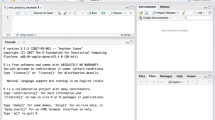Summary
Based on large samples of written text. ‘Zipf:s Law’ holds that the logarithms of frequencies of words, and the number of different words at those frequencies, have an inverse linear relationship. This study tested this law on an oral sample by analysis of a transcribed interview which had been conducted for an unrelated study. A second purpose was to test whether the law holds differently for open- vs closed-class words. The words in the interview were tabulated by frequencies and numbers of words at each frequency, and separated by syntactic class. As Zipf found for written samples, the law provides a reasonable summary of the data for the less frequently used words but predicts fewer different words among the most frequently used words than were actually found. Linear regressions performed for each syntactic class revealed that the regression equation for open-class words provided the best fit to Zipf's law. The sample of closed-class words, containing a much smaller proportion of low frequency words, revealed a poor fit to Zipf's law.
Similar content being viewed by others
References
Cherry C (1966) On human communication. MIT Press, Cambridge, Mass.
Mandelbrot B (1952) An informational theory of the structure of language based upon the theory of the statistical matching of messages and coding. Proceedings of the London Symposium
Miller GA (1965) Introduction to First MIT Press Paperback Edition of Zipf (1935)
Zipf GK (1935) The psychobiology of language. Houghton Mifflin, New York
Author information
Authors and Affiliations
Additional information
The author wishes to thank Diane Beyerchen, Wendy Calla, Edward Kulick, and Clinton B' Walker for their cooperation and suggestions.
Rights and permissions
About this article
Cite this article
Ridley, D.R. Zipf's Law in transcribed speech. Psychol. Res 44, 97–103 (1982). https://doi.org/10.1007/BF00308559
Received:
Issue Date:
DOI: https://doi.org/10.1007/BF00308559




